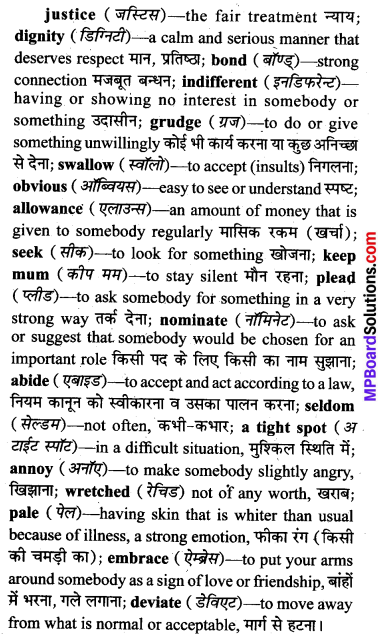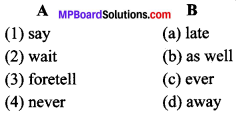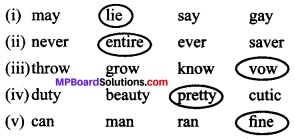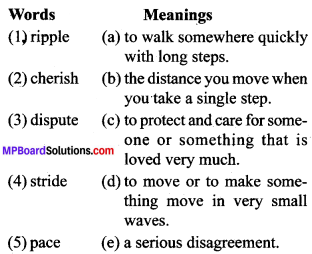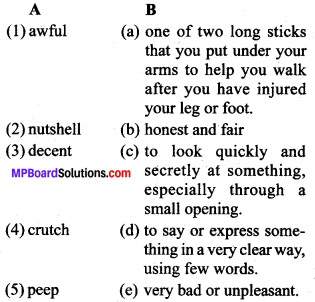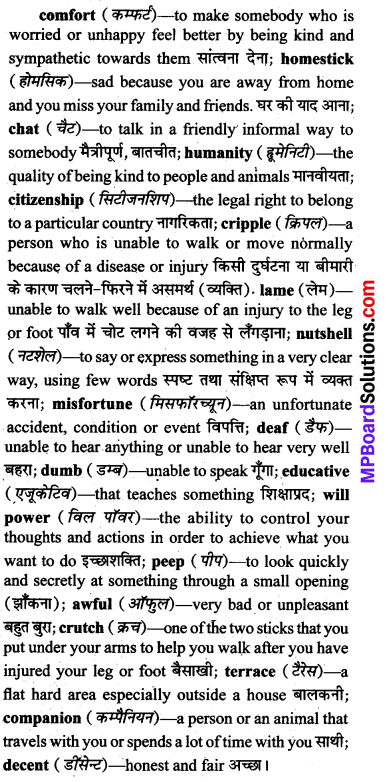MP Board Solutions for Class 9 English The Rainbow Workbook Solutions Chapter 15 How it all began Questions and Answers aids you to prepare all topics in it effectively. You need not worry about accuracy of Madhya Pradesh State Board Solutions for Class 9 English Chapter 15 How it all began as they are given adhering to the latest exam pattern and syllabus guidelines. You Can Download MP Board Class 9 English Solutions Questions and Answers, Notes, Summary, Guide pdf on is page. Enhance your subject knowledge by preparing from Chapterwise MP Board Solutions for Class 9 English and clarify your doubts on corresponding topics.
MP Board Class 9th English The Rainbow Workbook Solutions Chapter 15 How it all began
Kick start your preparation by using our online resource Madhya Pradesh State Board Solutions for Class 9 English The Rainbow Workbook Solutions Chapter 15 How it all began. You can even download MP Board Solutions for Class 9 English free of cost rough direct links available on our page. Clear your queries and understand concept behind in a simple manner. Simply tap on concept you wish to prepare chapterwise and go rough it.
How it all began Vocabulary and Pronunciation
A. What is the difference in meaning of the following words given in pair :
ago — before
also — too
most — many
journy — voyage
adjacent — neighbouring
Answer:
Do yourself
B. The compound word ‘neighourhood’ end in ‘hood’. Now write some more words with the suffix ‘hood’.
Answer:
Childhood, motherhood, boyhood, fatherhood, livelehood
C. Look at the common expressions of frequency. Study them carefully and point out the number of vowel sounds in them.
1. always
2. usually, regularly
3. often, frequently
4. gradually, slowly
Answer:
1. a, ay, 2. all, 3. o, te, re, erv, y, 4. ra, ua, y, o, y
D. Use the word ‘when’ in the beginning of a sentence and then in the middle of a sentence. What difference does it make? Example : When I returned, I felt tired.
I returned when I felt tired.
Now, frame some more sentences as shown above.
Question 1.
When I knew, I understood.
Answer:
I knew when I understood.
Question 2.
When he came, he gave me the information.
Answer:
He came when he gave me the information.
Listening Skill
Listen to the words.
See workbook page 111.
Now, recall the aforesaid.
Answer:
Do yourself.
Speaking Skill
Recall and repeat orally any two of the following.
See workbook pages 111-112.
Answer:
Do yourself.
Reading Skill
Read the following passage carefully and answer the questions given below it.
See workbook pages 112-113.
Question 1.
(a) How did the grandmother attend to her grandson ?
Answer:
The grandmother attend to her grandson with all attention.
(b) What did she do while she bathed ?
Answer:
She said her morning prayer in a monotonous sing song while she bathed.
(c) What does the author compare his grandmother with ?
Answer:
The author compares his grandmother with the winter landscape in the mountains.
(d) How did the grandmother take care of the study material of her grandson ?
Answer:
The grandmother tied them in a bundle and hand them to ‘he author.
(e) Why did she carry stale chapattis with her ?
Answer:
She carried stale chapattis to feed the village dogs.
(f) Why were grandmother and the author good friends ?
Answer:
Because the author spent his childhood days with her when his parents left him with her.
Question 2.
Find out the words from passage which have the following meaning:
(a) everything you can see when you look across a large area of land especially in the country……………
(b) serene – calm and peaceful, …………
(c) all the time, repeatedly……………
(d) never changing and therefore forming, ……………..
(e) spent time and / or energy doing nothing, ……………….
(f) the holy books of a particular religion, the Bible etc …………….
Answer:
(a) landscape
(b) serenity
(c) constantly
(d) monotonous
(e) hobbling
(f) scriptures.
Language Practice (Grammar)
Preposition
See workbook pages 114-116.
Pick out the preposition in the following sentences.
1. The two cats fought with each other for the cake.
2. The Pied Piper stepped into the street.
3. Rain, Rain go away to Spain.
4. Under the spreading chesnut tree we are happy.
5. We go to school everyday at 7 o’ clock in the morning.
6. We rowed across the backwaters and reached the house.
7. A sand storm blew over Delhi and tore down many temporary sheds.
Answer:
- with, for
- into
- to
- under
- to, at, in
- across
- over, down.
Writing Skill
A. Your sister collects stamps. Write a letter encouraging her to continue this hobby.
(50 words)
Answer:
Dear Rakhi
I am happy to know about your hobby of stamp collection. It’s really a good choice. You can know a lot of things through it. It earns your great knowledge, you can know the historical facts also. You keep it continued for ever.
Yours,
Anurag.
B. Write the various activities of the Nature Club of your school. (150 words)
Answer:
There is a Nature Club in our locality. Some of the youngsters of our society have organised if. Its functions are very productive. The members have divided the whole region in different section. They promote plantation, water conservation, rain water harvesting, education to children, cleanliness etc. They educate people the importance of nature in our life and teach them how we are damaging it, how we can cope up with nature. Now the government is also giving attention to this club.
We believe the information shared regarding MP Board Solutions for Class 9 English The Rainbow Workbook Solutions Chapter 15 How it all began Questions and Answers as far as our knowledge is concerned is true and reliable. In case of any queries or suggestions do leave us your feedback and our team will guide you at soonest possibility. Bookmark our site to avail latest updates on several state board Solutions at your fingertips.
